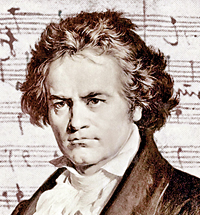CMSC begins year-long celebration of Beethoven’s music
View(s): In 2020, Germany will celebrate the 250th birthday of Ludwig van Beethoven, arguably its most famous citizen with the whole world. The Chamber Music Society of Colombo (CMSC) in association with the Goethe-Institut, Colombo, will begin the year-long celebration of the Maestro’s music with a concert on January 26 at the Goethe-Institut Hall. The concert will be devoted to his chamber music. Sonatas, trios and his much neglected vocal music will be presented.
In 2020, Germany will celebrate the 250th birthday of Ludwig van Beethoven, arguably its most famous citizen with the whole world. The Chamber Music Society of Colombo (CMSC) in association with the Goethe-Institut, Colombo, will begin the year-long celebration of the Maestro’s music with a concert on January 26 at the Goethe-Institut Hall. The concert will be devoted to his chamber music. Sonatas, trios and his much neglected vocal music will be presented.
Beethoven’s Piano Trio Op. 1 No. 1 (written for piano, violin and cello) was first performed in 1795 in the palace of Prince Lichnowsky, to whom it is dedicated. The trio was published in 1795. Despite the Op. 1, No. 1 designation, this trio was not Beethoven’s first composition; this distinction belongs rather to his Dressler Variations for keyboard (WoO 63). However, he clearly recognized this composition as the earliest one he had produced that was substantial enough (and marketable enough) to fill out a first major publication to introduce his style of writing to his peers and the public.
Beethoven learned to play the violin as a child and mastered the piano as an adult. His intense understanding of both instruments, and ability to combine them with remarkable innovation and originality, is heard in the ten sonatas he wrote for the combination.
In this concert, we will hear the vivacious first sonata, with the Violin and Piano engaging in an absorbing and diverse discourse.
It would probably come as a surprise to most classical music lovers to learn that the folksong arrangements form the largest body of work produced by the Master of Bonn. There are over 160 of them. And most of these are arrangements of Scottish, Irish, Welsh, and British songs. The idea for these folksong arrangements came from a Scotsman named George Thomson (1757-1851) of Edinburgh. Thayer in his classic biography of Beethoven tells us that Thomson “distinguished himself by tastes and acquirements which led to an appointment to the ‘Board of Trustees for the Encouragement of Arts and Manufacture in Scotland.’ He was, especially, a promoter of all good music and an earnest reviver of ancient Scottish melody.” To this end he engaged some of Europe’s foremost composers, Haydn, Pleyel, and Beethoven, to compose instrumental sonatas and song arrangements using Scottish melodies.
This concert will feature a selection that was written for voice and piano trio, and the songs will be announced from the stage.
Performing will be principals of the CMSC, Ramya Perera, piano, Sulara Nanayakkara, violin, Saranga Cooray, cello, Harin Amirthanathan, tenor. The concert will be moderated by the Artistic Director of the CMSC, Lakshman Joseph-de Saram.
Tickets for the concert on the 26th at 7 p.m. at the Goethe-Institut Hall are available at the venue, priced at Rs 1000 (unreserved).


